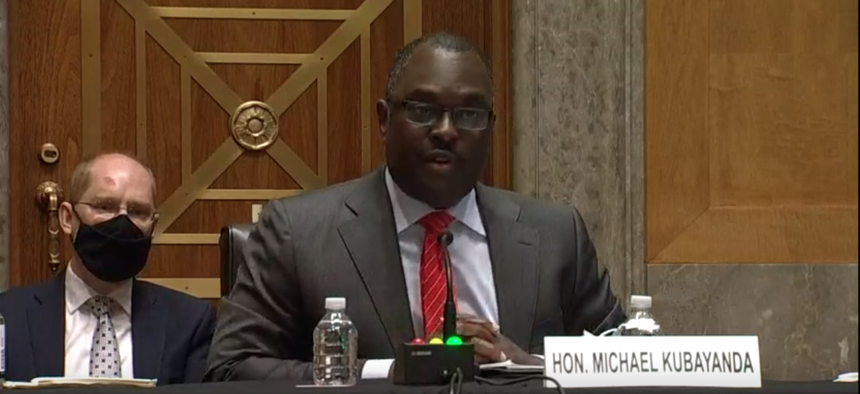
Postal Regulatory Commission Chairman Michael Kubayanda, shown here testifying at a hearing in November 2021. Kubayanda suggested the postal board was improperly interfering with the commission’s operations by not giving it the money it needs to meet demands. C-SPAN/Screengrab GovExec
USPS rejects regulator’s budget request, leaving watchdog to fear for its independence
The Postal Service has provided a small budget increase to its regulatory commission, but extends its feud with the watchdog by declining to provide the funds it says it needs to meet demands.
Leadership at the U.S. Postal Service has rejected its regulator’s budget request, instead granting the oversight body a funding boost that will provide a 10% cut to its initial ask.
The Postal Regulatory Commission, which submits an annual budget that the USPS board of governors can only alter through unanimous approval, initially requested $23.4 million for fiscal 2024. That plan would have allowed the commission to add staff and contract support to ensure it could “conduct effective oversight on a timely basis,” PRC said. Earlier this month, PRC suddenly revised that request downward to $22.6 million. It did so “in response to correspondence and discussions with the governors regarding the initial budget request,” according to the commission.
The board voted unanimously to adjust even that revised figure, however, and awarded a budget of $21.1 million. That marks a decrease of nearly 10% from PRC’s initial request and of about 7% from the updated proposal. In fiscal 2023, USPS approved a budget request of $20.6 million.
For more than a decade, Congress, rather than the USPS board, controlled PRC’s budget. In the 2022 Postal Reform Act, however, lawmakers shifted control back to the Postal Service. While commission members themselves have applauded that change, it gave more influence to a leadership group that has maintained a tense relationship with its regulators.
Postmaster General Louis DeJoy, who USPS said on Monday was not involved in the board’s budgeting decision, has called PRC an obstacle to progress and repeatedly requested they not stand in the way of his reforms. The Postal Service formally protested when PRC launched an ongoing review of the Postal Service’s plans to consolidate and otherwise reorient its processing and delivery network, but the commission rejected the appeal.
PRC said it sought its initial, higher budget total to absorb cost increases related to inflation, wages and leases, as well as added staff. When it lowered its ask, PRC said it would still cover growth in fixed costs but would not fund “increased capacity.”
Michael Kubayanda, the PRC chairman, suggested the postal board was improperly interfering with the commission’s operations.
“I appreciate the governors’ approval of a budget, but am disappointed that they declined to fund the commission’s modest request of $22.6 million, less than 0.03% of Postal Service revenues,” Kubayanda said. “Most importantly, this process raised red flags about potential risks to the commission’s independence.”
Kubayanda previously issued a public white paper saying his agency requires more staff and resources to keep pace with the changes underway at USPS. Despite DeJoy’s objections, he said, Postal Service regulation must take place with a frequency and intensity that former private sector executives—such as the current postmaster general—do not appreciate. Robert Taub, a former PRC chair who now serves as a commissioner and whose renomination was unanimously moved forward on Tuesday by the Senate Homeland Security and Government Affairs Committee, told lawmakers last week that the significant reforms underway at USPS required the commission sustain a proactive regulatory posture.
At a hearing earlier this year, DeJoy said it was PRC that had overstepped its authority.
“The Postal Regulatory Commission sat over and watched the destruction of the organization over the last 15 years and [was] actively participating in the destruction of the organization the last 15 years,” DeJoy said, adding he, on the other hand, was trying to save the agency. “What goes on and why they do the things they do, I have never figured out. And I'm a pretty smart guy.”
DeJoy previously said USPS would be better off without the PRC at all, making the comments in a light-hearted manner while seriously lamenting the regulators’ role. The Postal Service operates with a statutorily protected monopoly on all mail. PRC was established to ensure USPS, as a government entity, does not abuse that authority.
Roman Martinez, chair of the postal board, said the board members “recognize and respect” that PRC is an independent entity that requires adequate resources to carry out its duties. He noted that PRC can tap into other resources, such as rollover funds, that would provide it with $27.2 million in fiscal 2024 and increase estimated spending from the current fiscal year by 28%.
“The governors also recognize the need for responsible stewardship of the resources in the Postal Service Fund, which ultimately derive from users of the Postal Service,” Martinez said. “In our efforts to undertake the delicate balance required to represent the public interest in these respects, we unanimously agreed that the adjusted level of funding provided to the PRC is entirely sufficient for the PRC to fulfill its regulatory mandate.”
The PRC’s public inquiry into DeJoy’s large-scale network changes is currently open and soliciting comments.







